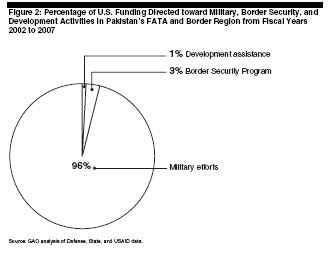Barney Rubin has an excellent post updating on latest developments in Pakistan’s federally administered tribal areas. Start, he says, from a clear recognition of one thing at least: the US has no plan. Here’s a graph from the US Government’s General Accountability Office which proves the point:

Note especially the amount being allocated to political reform, he says: 0%. Meanwhile, Khalid Aziz – the former chief secretary of NWFP – has been doing some serious strategising about what needs to happen next (in the wake of Pakistan’s elections – which as the BBC put it “saw an overwhelming vote for parties that advocate secularism, or the separation of religion from politics” in the NWFP). Aziz writes:
…the Feb 18 election has clearly indicated that the people of Pakistan voted against militarism and violence. The Taliban recognise that resort to force alone will not lead to the achievement of their main political objective which is the creation of an Islamist Caliphate.
However, while everyone waits for good sense to prevail, there may be forces amongst the non-state fighters planning another strike in the West. If that happens, one may be certain of an air war in FATA and this could lead to incalculable harm to Pakistan. This in a nutshell is the danger surrounding the process of talks. . . .
Many conservative Pakhtuns believe that the fighting in Swat, Kohat and Waziristan is a war of liberation against US occupation of Afghanistan; they fight the Pakistani state because of its alliance with the US. However, it does not make it a US war alone. Whatever may be the case at the start, this is now Pakistan’s war, since the objective of the insurgents is to change the nature of the Pakistani state. To fellow Pakistanis I would say that it is our war, whether we like it or not.
Compare that, Rubin says, to Musharraf – with whom “all negotiations with militants… had as their aim to balance the imperative of acting against al–Qaida with that of saving the Taliban as a strategic asset for Pakistan”. His conclusion:
We now have a full partner in Pakistan, elected, ironically enough, by Pakistani voters angry at what the GAO calls the “lack of a comprehensive plan,” rather than just a military approach. It is indeed time to “sit down and think through what we can collectively do” with these partners.



